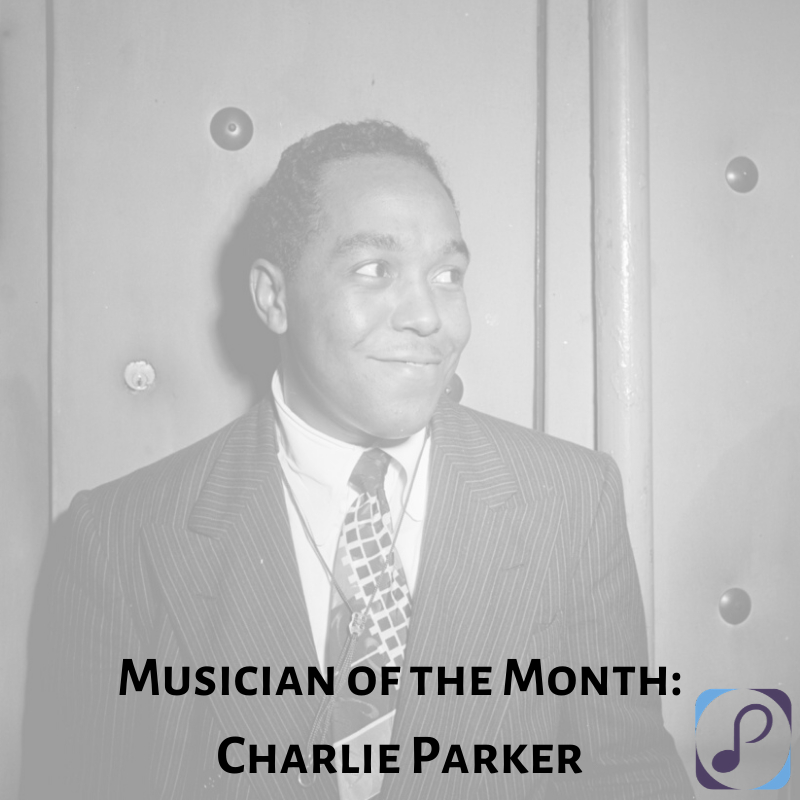Musician of the Month: Charlie Parker
Charlie Parker, the Grammy-award winning jazz saxophonist, certainly left his mark on the music industry before his early death. As an African American, Parker has made outstanding contributions to the American culture. As a musician, his profound impact on the music industry changed jazz music for the better.
Despite his deeply troubled life, Charlie Parker was a musical genius. Outside of his compilations, Parker’s most influential contribution to the music industry came from being bored by popular music. Alongside Dizzy Gillespie, Parker discovered a signature jazz technique that would later be known to the world as bop or bebop music. His famous bandmate, Jay McShann, summed up the life of Charlie Parker in this quote: “There was one thing he wanted to do. He didn’t worry about anything else- as long as he could play that horn.” With music written into his DNA, let’s take a look at the life and music of the jazz great, Charlie Parker.
Musical Contributions of Charlie Parker
Charlie Parker was one of the most important musical figures in the development of jazz. Growing up in the jazz district of Kansas City, Missouri, Parker was inspired by the musicians he saw around 12th Street and Vine. Once his mother scraped together enough money to gift him a beaten up, second-hand alto sax, Parker got to work learning the instrument that would make him famous. In his teens, Parker emerged on the Kansas City nightclub scene as a local jazz and blues musician, playing as a professional musician and jamming his way to the top.
In 1937, at the age of 17, Charlie Parker landed his first permanent job at a resort in the Ozark Mountains. From here, he went on to join Jay McShann’s band in New York City. In 1940, the group made their first official recording, bringing Parker’s music beyond the nightclub scene and into the ears of listeners worldwide. He was discovered by Dizzy Gillespie in 1942 for his unique playing style. But Parker’s breakthrough in the music industry came in 1945 when he started his own group while working alongside Gillespie.
As the master of improvisation, Parker continued to make his mark on the music industry from NYC to Chicago. Bored by popular music, he discovered a signature technique by playing higher intervals of chords for the melody and making changes to back them up. This new technique would lead Parker and Gillespie to create the popular jazz style known today as bebop or bop.
In January of 1947, Parker formed a quintet. It was during this time that Parker would create and perform his best known and loved music, with popular pieces like Cool Blues. Check out some other famous works of Charlie Parker, several that you’ll recognize from covers by today’s prominent musicians:
Interesting Facts About the King of Bebop
Charlie Parker’s nickname was the “Bird,” short for “Yardbird.” He is said to inherit the nickname for one of two reasons- because he was as free as a bird or because he accidentally hit a chicken while driving on tour with his band.
When he was a kid, he would practice up to 15 hours per day!!!
The Birdland Club was developed and named for Parker in the 1950s. It was here that he performed his last public show, a week before he died.
Parker died on March 12th, 1955, after refusing to go to the hospital for an ulcer attack. He succumbed to lobar pneumonia and the long-term effects of his years of substance abuse.
Clint Eastwood made a movie on the life of Charlie Parker, titled Bird.
The Personal Life of Charlie Parker
Charles Parker Jr. was born on August 29th, 1920, to a teenage mother. His father worked in a traveling minstrel show and his mother worked as an office cleaner to make ends meet and care for her family. Parker began playing the alto saxophone at the young age of thirteen, quitting school to pursue his passion for music a year later. He married his childhood sweetheart, Rebecca Ruffin, at the young age of sixteen. Despite his overwhelming struggles in life, Charlie “Bird” Parker undoubtedly left a profound mark on the music industry. Perhaps it was the fact that he struggled that led the famous jazz musician to compile some of the most significant jazz pieces ever. Maybe it was in his deepest struggles that Parker created his most inspirational musical contributions. After all, it was Charlie Parker himself who was quoted as saying, “if you don’t live it, it won’t come out your horn.”

